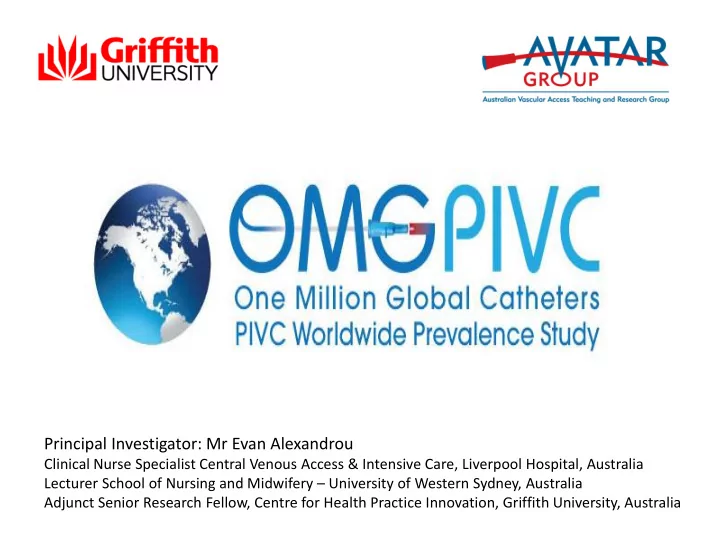

Principal Investigator: Mr Evan Alexandrou Clinical Nurse Specialist Central Venous Access & Intensive Care, Liverpool Hospital, Australia Lecturer School of Nursing and Midwifery – University of Western Sydney, Australia Adjunct Senior Research Fellow, Centre for Health Practice Innovation, Griffith University, Australia
Purpose of the research • The One Million Global (OMG) peripheral intravenous catheters (PIVC) study is an international prevalence investigation specifically targeting assessment and management of PIVCs across more than 50 countries. • This study will be the largest of its kind ever attempted and will provide previously unavailable data on the prevalence and management of PIVCs including the average dwell of a PIVC and identifying risk factors contributing to PIVC failure.
Reason for the study • The study will discover what is happening with PIVCs in clinical practice. • Is clinical practice making the best use of evidence? • Are we doing the best we can for our patients? • If not, how can we do better? • The study will help people to evaluate their own practice, compare it to the research, benchmark with other hospitals, and discover ways to improve patient safety and healthcare.
Aims of the study • To identify and compare the prevalence of PIVCs in hospital populations worldwide. • To evaluate the prevalence of PIVC complications (extravasation, phlebitis, occlusion, thrombosis) in patients with PIVCs worldwide. • To benchmark international use of PIVCs, including cannula characteristics such as type and size, anatomical placement along with types of intravenous fluids and medications infused. • To identify risk factors associated with PIVC failure.
More aims of the study • To identify the prevalence of unused or unneeded catheters. • To identify the current practice in PIVC dressing use and management. • To identify the current practices in PIVC securement. • To compare local hospital policies on PIVC insertion and management with international guidelines. • To encourage future international collaborative research among vascular access nurses and physicians.
What’s involved? • On a given day in 2014/2015, participating organizations will be asked to conduct one assessment of all patients (both adults and children) with a PIVC. • The chosen day will be decided by each hospital to suit workload, staffing, etc.
Study Process • If you decide to participate, sign and return the Authorship Agreement form • Send your hospital and/or ethics/IRB approval notice to us • We will send you your unique study code and the link to the online data collection surveys • If you prefer, you can complete the study on paper and scan/email/post it to us
Data to be collected • All of the study tools will be available for completion on paper or on-line. • Write your study code on each form! Top right corner • The Site Information form is filled in once per hospital.
Data to be collected • The Screening log will be filled in on the day of data collection by each participating ward/unit. • Documents prevalence of PIVCs and other IVs • Documents patient consent for their details to be collected for study purposes.
Data to be collected • The Data Collection form is completed for every PIVC in situ on the ward/unit at time of data collection.
What data will be collected? No identifying patient data will be collected! • • Age and gender of patient IV connectors in use • • Type of health condition: PIVC site assessment Medical/surgical/oncology • IV securement method /critical care, obstetrics, etc. • IV dressing type • Date and time of PIVC insertion • IV dressing assessment • Cannula type/brand (if known) • IV orders today (from med chart) • Who inserted the PIVC (if known) • IV fluids today (from med chart) • Where was the PIVC inserted (if • IV medications today (from med known) chart) • Site/position of PIVC insertion • Patient satisfaction with the PIVC, • Cannula gauge/size scale 0-10
What happens to the data? • You enter the data in the online database or fax/scan/email/post the data to us. • We compile all the data and analyse the results. • Each hospital in the study will be de-identified and have a unique identifier.
Data continued… • We will not share your data with other organisations. • We will publish the results by country, not by hospital, so your own results will remain confidential. • Any data you collect remains the property of your hospital. • The results will be published in a peer-reviewed journal and presented at international conferences.
What are the benefits for my hospital? • Benchmark with other hospitals in your local area or country. • Compare performance, identify areas for further education, patient safety initiatives, quality control issues, use of consumables (dressings, IV cannulas), number of redundant cannulas, etc. • Acknowledgement of participation in the study in the final journal publication
What are the risks? • This is a very low risk observational study. • No interventions are planned, but if a PIVC problem is detected, the patient’s nurse will be notified . • This study has Griffith University Human Research Ethics Committee approval, NSW HREC approval and QLD HREC approval. It has also been approved by many overseas ethics committees.
How to register • Go to the website www.omgpivc.org • Click ‘Register Here’ We will then send you everything you need to get going.
What happens next? • After you register, we will contact you and keep you informed about the study. • We will send you all the study documents in your language of choice. • If your site needs Ethics/IRB approval to proceed, we can help with this.
Over 550 hospitals in more than 50 countries have now signed up!
Thanks for your interest! We hope you decide to join! Email: omgstudy-group@griffith.edu.au
Recommend
More recommend